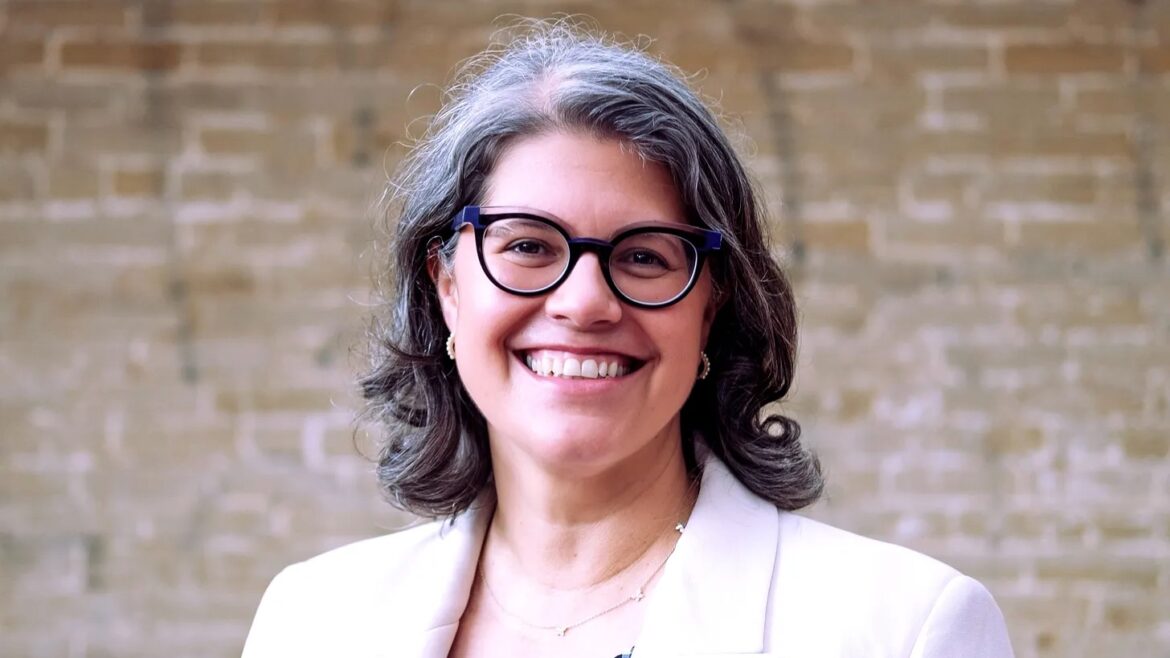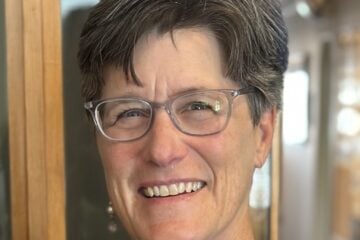A Latina leads change in D.C. journalism

Frontado
This interview was first published in the author’s newsletter, OIGO, and is republished here with permission.
In February, WAMU closed DCist and laid off staff. The story usually ends here.
Not this time. Former DCist staffers launched The 51st, with a successful fundraiser. And a Latina public media veteran is one of its catalysts.
This OIGO, Teresa Elena Frontado, co-founder of the 51st, is here. With over 20 years in the field, Teresa has held prominent positions at WAMU, KUT and WLRN, as well as Univision Noticias, The Miami Herald, El Nacional (Venezuela) and El Universal (Venezuela). She has insights about community engagement and localism, both in our visit and in her vision for The 51st.
Teresa also addresses the critical issue of diversity in journalism. She has much to say about setbacks in representation. She also has advice for leaders and for staff.
How would you sum up your public media experience?
I went to public media after doing the Knight-Wallace fellowship at the University of Michigan, which was for mid-career journalists. I was coming out of Univision. During that year, I did a lot of thinking about my values as a journalist and what I wanted. I’m one of those people who became a journalist because I want to change the world for good. One of the takeaways from my fellowship year was that I wanted to go back into local journalism.
I was very deliberate in my job search. As it happened, there was an opening at WLRN, a Miami public radio station. And even though I told them I didn’t know radio, they said, “We don’t know digital.” They needed someone to lead them into the multiplatform, digital world, and that’s how I started in public media.
It’s been an amazing experience, though tough in several ways. The emphasis on local audiences and the passion for our communities have been the most significant takeaways for me. I’ve worked in newsrooms in Florida, Texas, Virginia and the District of Columbia, and have colleagues around the country. It’s incredible how dedicated public media journalists are. We’re small and nimble, often punching above our weight because we care deeply about the communities we serve.
The types of stories we tackle are often very impactful. We tell stories that make people stop in their tracks and stay in their cars in the summer heat to listen. My colleagues in public media are interesting, fun and creative, with many of them having fascinating interests outside of work. For example, one of my reporters in Miami played the banjo in a band, and we would go to her concerts.
In terms of challenges, I worry about the pendulum and how it will affect diversity efforts. After the push for diversity following 2020, we’re now seeing the other side with hiring freezes, layoffs and less representation in newsrooms. This is a big concern, especially when you look at stations around the country. I’m an optimist by nature, but it’s a tough time for diversity in public media.
How should those of us who are in the system and care about diversity and inclusion be moving within our organizations?
The challenge is continuing to speak up, even when organizations may not want to listen to what we’re saying. That is a frustration that you and I know very well — pointing out issues, and maybe not necessarily getting the results immediately that you wish for. But we have to keep on speaking up and calling attention to the fact that we need to diversify our newsrooms to really reflect the communities that we cover, the communities that frankly every public media newsroom cares deeply about.
You and I know how hard it can be as an individual to feel like you’re speaking about something that people don’t want to hear. It’s personally hard. So, I think it’s also a good time for us to reach out to each other and to other folks in our newsrooms and support each other. Diversity is crucial for good journalism. It’s embedded in what we do. How can we be complete if we don’t have the perspective of a percentage of the population in our market, like the Latino population? Support, persistence and hope that all these efforts will eventually bring positive change.
You’ve been in a leadership position, and you’ve talked with many leaders who were above you as well as your peers. What suggestions would you have for them?
There’s a keen awareness in most newsrooms of the need to be diverse. Not only diverse sources, which is crucial, but also who’s there, who’s present. It’s important not only to hire diverse staff, but to give them agency and make it a safe space for people to speak up. For example, I heard a local public station story about disappearing trailer parks that felt out of touch in its framing. The reporter made it sound like they aren’t in the community, but literally there are three trailer parks near me. It was evident the journalist hadn’t experienced that environment. So, we need diversity at different levels to ensure our stories are relevant and accurate.
We also need conversations with leaders beyond the newsroom. I still hear from the membership/advancement side of things, and there’s a persistent belief that communities of color don’t support public media financially, so we’ll just do what we always have done. But that belief is not true. Other sectors have shown that these communities are engaged and willing to contribute. We need to change our strategies to include and reach out to them.
It’s essential to think about the long game and invest time in engaging with diverse communities. The future of public media depends on the ability to adapt and reflect the changing demographics of audiences. We need to cultivate relationships and build larger networks within these communities to sustain and grow.
That’s an interesting point, as it touches on how organizations sustain themselves and who public media serves. Without creative efforts to build relationships and expand networks in these communities, this cycle continues.
Here’s a dramatic example of it. I went to the NAHJ conference as somebody who worked in Univision, and a lot of young people would be like, “Oh my God, you work for Univision” and there was all this excitement. The following year, I went as a representative of WLRN, the NPR member station in Miami. There was definitely less excitement, not because of the work that the newsroom does, but because there hasn’t been a systematic effort to take the brand into the Latino or the Hispanic community in Miami. That tells you something.
Let’s switch to a happier topic: the birth of The 51st.
The 51st is in the nonprofit space, so it’s still in that mindset. It started in the aftermath of WAMU shutting down DCist and aims to fill the gap in local journalism in the D.C. area. DCist was very popular, but WAMU was not able to figure out how to make it work in their business model. We thought a long time about how we can keep this community from losing coverage, and came up with The 51st.
The 51st is not a redux of DCist. It’s about taking those lessons and applying them in a community-focused way. Washington, D.C., is not a news desert, but most outlets look at federal institutions. We’re focusing on local affordability, housing, education, watchdog journalism and coverage that shows a pride of place. We’re not focusing on a website or being a daily news outlet. Rather, we’re launching a weekly newsletter with deep dives into important issues and emphasis on community engagement.
We’ve been popping up in different places around DC to ask people what they want from local news. We’ve shown up at events and markets with Post-it notes, asking people what they want of their local news. The responses have been wonderful and informative. We’re also hearing so much from communities of color on the importance of showing up consistently. In the historically Black neighborhood of Ward 8, there was a lot of emphasis on commitment and not just extracting stories and leaving. That comment was noted. We want to be part of the community fabric.
What is the most surprising thing you saw on a Post-it note?
Local high-school sports. It was not a soccer mom, but this young guy who said, “You know, there’s a lot of talk about the Washington Nationals and the big teams, but there’s a lot of community built around local sports teams.” That was very interesting.
We’ve also had great discussions about the role of nonprofits in the community. We had a conversation about that, because so many in our region work in nonprofits, care and want to give, so we need to make that reporting meaningful.
Beyond these areas, how is The 51st going to differ in terms of editorial from DCist?
DCist, especially after WAMU acquired it, was expanding to cover Maryland and Virginia, reflecting the region’s organic nature. We’re going to be way more targeted in the kind of stories we cover. Instead of focusing on the daily news cycle, we have the opportunity to go deep into issues in a weekly newsletter. The 51st won’t be a daily. This allows us to do more meaningful engagement work with our audience and provide more relevant coverage.
What has caught your attention during this fundraising campaign?
We have been working five months to set this up, but there’s always uncertainty. We barely slept the day before, because you just never know. It’s been five months since DCist went away, and that means the audience may have moved to other spaces. Are they happy where they are? Are they happy where they’re getting their information now? You never know.
It has been overwhelming to see the response from the community. We reached 70% of our fundraising goal in the first week, which is humbling and incredible. It tells you that there is indeed a need in this community. These funds are not coming from foundations or grants; these are folks giving us five bucks, 10 bucks, 200 bucks, 1,000 bucks sometimes. It’s been very moving to see that and hear people say, “Yes, we need this.” A couple of times, I have wanted to cry. The comments have been touching. But we’re also emboldened because we’re onto something.
What advice would you give early-career Latines coming into journalism?
Gabriel Garcia Marquez said that journalism is el mejor oficio del mundo, the best profession in the world. I personally think so, which is why I’m still here. There’s a lot of good you can do with your work, and you can make a big difference in communities.
But you have to be persistent. It’s not easy to be a person of color in journalism for many reasons. Work on yourself so you can feel like you belong in every room you walk into, because there are still a lot of structural issues that make us feel otherwise.
It’s important to build a network of people who can support you on tough days. Work to feel like you belong — because just by the fact that you’re in that room, you’re already making a difference.






